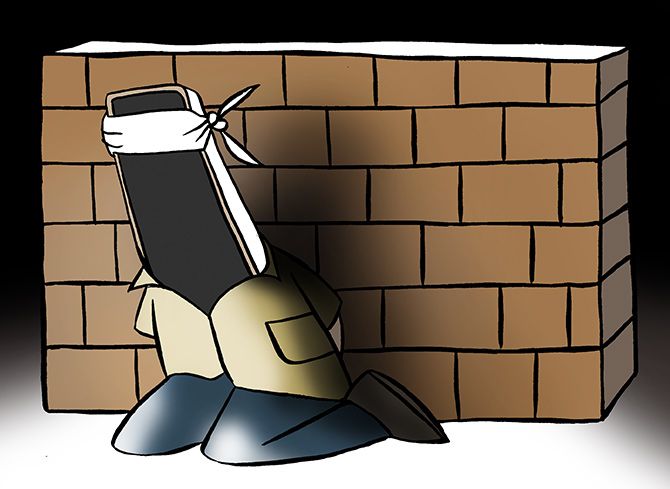'It would be too sweeping to say that the elites and the middle-class don't care about liberty.'
'It is just that they are always calculating the trade-offs: What's in it for me, what could it cost me?'
'To that extent, we haven't changed in 40 years,' says Shekhar Gupta.
Illustration: Uttam Ghosh/Rediff.com

In this season of alternative histories, is it possible to script one for the Emergency? It was the darkest period in the history of independent India and people refused to put up with it.
Many, including in journalism (nobody used the description 'media') and the judiciary, joined the fightback. All this built a wave of anger that swept Dev Kanta Barooah's 'Indira-is-India' Gandhi, her son Sanjay and the gaggle of sycophants into the trash can, or rather more suitable for our capital city, overflowing garbage landfills of history.
The prime minister likes to invoke the Emergency often and cautions us against a recurrence of any such. He did so, while speaking at the Excellence in Journalism awards, named after Ramnath Goenka, who is our media history's proud mascot of the resistance to the Emergency.
It's a good warning, because the Emergency may have ended almost 40 years ago, but the threat of a return of authoritarianism remains.
Note, the speech came almost exactly at the time the ministry of information and broadcasting issued a punitive one-day ban on NDTV's Hindi channel, apparently for not following the code of conduct during its live coverage of the Pathankot attack.
Let us accept that the two things, the speech and the ban order, were purely coincidental.
If anything, the ministry could have thought better than issue the first censorship order on a major news organisation since it imposed pre-censorship under V C Shukla during the Emergency, on the same evening Indian journalism was celebrating its doughtiest fighter against it.
But it's Bharat Sarkar, so stuff happens.
On the day the text of the PM's speech, exhorting us to be vigilant that no Emergency-like calamity should ever again come to pass, is published, the venerable Editors Guild of India issued a condemnation of the ban on NDTV, comparing it with censorship during the Emergency.
I use the adjective 'venerable' for the EGI for two reasons. One, that over the years with newspaper owners stepping into active editorial shoes or insisting on 'low-profile' editors, it had become a kind of conservative, old-school club, that doesn't meet too often, has struggled to even create a proper Web site or Twitter handle.
Second, because the language the EGI has used in the past, even while protesting, has been of old-school editorial writing: Restrained, understated, measured.
The latest one is wrapped in mirchi and packed with gunpowder.
L K Advani made that immortal and fair comment that when asked to bend, the Indian press crawled. The sad fact is, the Indian press failed to show any fight or spunk barring a few like Goenka's The Indian Express, C R Irani's The Statesman and the bravest of all, the little magazine Himmat, run by Rajmohan Gandhi, who also mentored many of the most familiar bylines of subsequent decades.
Indira Gandhi's hostility to the national press -- which she first disparaged as jute press (because some of the owners were jute barons) and then as jhoot (falsehood) press -- had become an assault as her halo of the Bangladesh victory dimmed, mostly by rising inflation crossing 25 per cent and popular disenchantment not calmed even by the first Pokharan blast of 1974.
The first prominent editor who lost his job was B G Verghese. He had been a marked man since a year before his eventual sack in September 1975, within three months of the Emergency, after he wrote a tough signed editorial, 'Kanchenjunga, here we come,' calling the merger of Sikkim, an annexation.
He was immediately called anti-national. The interesting thing is, most of Verghese's peers did not rise to his defence, at least not with any degree of conviction.
Freedom of speech is okay, but do you really have to question the merger of Sikkim in supreme national interest? Journalists from his own newspaper, The Hindustan Times, were a brave exception.
You'd find similar equivocation in the media's fightback on NDTV. EGI, and much of the print media (or what was earlier called 'press'), would protest, but many of the dominant TV channels won't, again invoking the principle of national interest.
The same TRP-friendly hyper-patriotic self-righteousness that persuades many of these to avoid the Bhopal encounter story altogether, forget calling it what a proper and fair probe might just prove it to be: A cold-blooded, pre-meditated murder.
Our coverage of daily loss of life on the LoC now tends to be even more one-sided than in the pre-Simla Accord of 1960s when it was still the Cease-Fire Line.
We acknowledge that the Narendra Modi government has a new doctrine, but do not consider it worthwhile, even 'desirable', to debate its merits.
The doctrine of strategic restraint that survived five governments has now been replaced by a new Modi-Doval Doctrine.
To debate this, forget questioning it, is no longer supposedly in the national interest.
The fact is, the audiences, the janata and the market also want none of it, except breathless warmongering and triumphalism.
It shows in the ratings of warrior channels versus those that pause, search for facts and where needed, raise questions.
In the Emergency, we crawled out of fear. Now, most of us are doing so out of greed.
Indira Gandhi also used hyper-nationalism in the run-up to the Emergency and later to justify it.
The assassinations of Sheikh Mujibur Rahman next door and Salvador Allende in distant Chile were used as evidence of the foreign hand behind Jayaprakash Narayan's movement, and as justification for the clampdown.
This, at a time when India had just broken up Pakistan, destroyed the Naxal movement and external and internal threat was at its lowest since 1947.
There was careful, if crude, meshing of nationalist paranoia with fake socialism.
Of all the infamous Emergency slogans on our buses, my favourite is 'Beware of rumour-mongers.' In more direct English, it would read, shoot the messenger.
Did India of four decades ago buy this? Or did it see through it, fight back, and restore its freedoms?
Subsequent history would point to the former, but it is only part of the story.
The fact is, until the Emergency regime launched forth with forced sterilisations and got the invisible poor multitudes in the north furious, the elites and the middle-classes didn't quite mind losing some freedoms if, in the bargain, trains ran on time.
It is a debatable point, I concede. But what do the results of the 1977 polls, where Indira Gandhi was wiped out in the north and the heartland (where sterilisations were carried out) but swept everything south of the Vindhyas (where it wasn't) indicate?
It would be too sweeping to say that the elites and the middle-class don't care about liberty. It is just that they are always calculating the trade-offs: What's in it for me, what could it cost me? To that extent, we haven't changed in 40 years.
We were complicit in 1975-1977 as the press was silenced, civil society assaulted and the poor hit with an atrocity that is described in the most familiar 1977 slogan: 'Nasbandi (vasectomy) ke teen dalal, Indira, Sanjay, Bansi Lal.'
With silence over the new assault on the media, brazen fake encounters and a State-mandated definition of cultural nationalism, we are repeating our inglorious performance of that past.
The dangers are now bigger.
One, because an external enemy is now visible.
Second, a better-performing economy feeds triumphalism.
And third, because today most established socio-political forces have lost their fundamental beliefs and are running their politics through TRP and public opinion management instead.
Today, the only cohesive, clear-headed pan-national socio-political organisation in our country is the Rashtriya Swayamsevak Sangh.
In 1975-1977 it led the fight against the Emergency. Today, it leads the establishment.
This column was first published on December 19, 2016. It is being republished today, on the 42nd anniversary of the Emergency.











